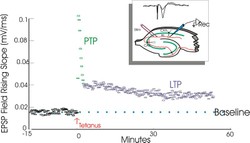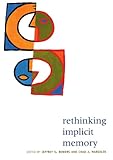
The Study of Memory: Implicit & Explicit Memories & Long Term Potentiation
by bhthanks
Human Memory: Implicit memories and explicit memories, long term memory, long term potentiation (LTP)
Implicit Memories : Memory Psychology
 | Rethinking Implicit MemoryOxford University Press / |
Implicit Memory and Explicit Memories
Implicit memory is expressed by improved performance without conscious recall or recognition, while explicit memory refers to conscious memories that we are aware of.
Explicit memories would be when a person asks us our name, phone number or hair color, and we consciously remember it and tell it to them.
Fears and preferences that develop as a result of associations are implicit memories. An example would be if someone once had a severe allergic reaction to a certain food, then much later on when exposed to it, the person may instantly feel nausea and an aversion to it, without even realizing the cause of his feelings. Many times when a person types, it is implicit- they don't even think about what they're doing. Another implicit action would be while walking into, or out of, a room and automatically feeling for the light and closing it. Dreams are implicit.
Implicit and Explicit Memories
 | The Development of Implicit and Explicit Memory (Advances in Consciousness Research) John Benjamins Publishing Company Only $108.0 |
Long Term Potentiation Psychology
 | Neuronal Mechanisms of Memory Formation: Concepts of Long-term Potentiation and Beyond Cambridge University Press |
Long Term Memory: Long Term Potentiation - LTP
LTP is one of the most intensely studied of all neuro-scientific phenomena. The synapse has high intensity, high frequency stimulation. Long Term Potentiation is the enduring facilitation of the synaptic transmission. Some people have it better than others, and this gives them the ability to keep running or keep throwing for long periods, while others wear out sooner. Long Term Potentiation is being studied because it causes more memory and the ability to keep on doing something. The goal is to learn how to speed it up and use it to our benefit, as well as to learn how to slow it up, to hopefully help in stopping tremors in people with Parkinson's and similar disorders.
Long Term Potentiation Memory
 | Neuronal Mechanisms of Memory Formation: Concepts of Long-term Potentiation and BeyondCambridge University Press / |
 | Memory, Amnesia, Amygdala, Hippocampus, Neural Networks, Long Term Potentiation, Dissociation, Co...University Press / Only $7.99 |
The Study of Human Memory
The study of the anatomy of memory has come a long way over the years. Many more advances will be made in the next decade. Most memory processes occur in the hippocampus in the brain. Over time, we have learnt new teaching techniques that stimulate memory, such as writing. The more we know about built memory structures in the brain and how they're encoded, the better we'll be able to teach and learn. We already know some techniques. We know that the brain works better when it is given proper nutrition which helps memory, such as Omega-3 and Vitamin E.
The Study of Memory
Case studies have played a particularly important role in the study of memory. This is because one can compare results and see why they're different and how it plays out. These studies have helped people to learn, remember, and forget. Many case studies are needed in order to gain an accurate understanding of these findings.
There are both advantages and shortcomings of animal models of amnesia and memory loss. Monkey and rat models are useful. A shortcoming is that they can't tell us what they do or don't remember. An advantage is that humans are not being harmed. Another advantage is that animals are less likely to be faking or worried about peer pressure, the way humans are. Animals are not subjective like humans are.
long-term potentiation (LTP): Image Source: http://en.wikipedia.org/wiki/File:LTP_exemplar.jpg
You might also like
Custom Ernst Haeckel on T-Shirts and GiftsAre you excited about biology? Zazzle is the comprehensive POD for Ernst Hae...
SleepCan't sleep? Sleeping too much? Always tired? Importance of sleep, how to go ...



 eFaxon 05/11/2012
eFaxon 05/11/2012
 BNSF's Case of Illegal Genetic Screening in the Workplaceon 01/01/2012
BNSF's Case of Illegal Genetic Screening in the Workplaceon 01/01/2012
 Delicious Cake Recipes From Scratchon 04/03/2012
Delicious Cake Recipes From Scratchon 04/03/2012
 Easy and Delicious Recipes for Newbieson 04/03/2012
Easy and Delicious Recipes for Newbieson 04/03/2012



Comments